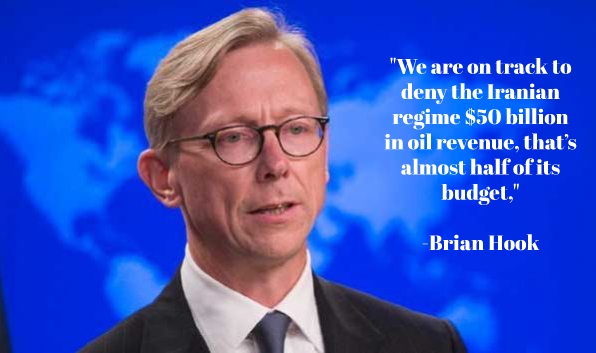US ‘determined to confront’ Iran’s violent expansionism
A senior US official has stressed his country’s readiness and willingness to continue to work with its partners to confront Iran’s expansionist violent policy. “Even if you get outside the region, to Europe or elsewhere, no one is defending Iran’s expansionist violent policy,” US Special Representative for Iran and Senior Policy Adviser to the Secretary of State Brian Hook said yesterday.
“They have known Iran for four decades. Bahrain has been targeted many times and this government has done a very good job of standing up to Iranian aggression and will continue to do that. “They are security partners and close friends and continue to be working together,” he said during a session with the local media in the Bahraini capital. The US official said they kept their diplomacy squarely within the left right limits “Our diplomacy has stayed within diplomatic limits, but you can’t say that about Iran; it has responded to diplomacy with violence and force.” Hook said there was “very strong support for President Trump policy to Iran,” a country that has “rejected diplomacy so many times.”
“The economic pressure and economic isolation, these are the necessary ingredients in order to both deny Iran the revenue it needs to fund its proxies and fund its military but also to bring it back to the negotiating table,” Hook said. Iran uses surrogates and direct attacks and exports its revolution, which is the source of so much instability in the region today, he added. However, the US action has financially hurt Iran’s proxies, he noted. “We have made very rapid progress in a very short time. We are on track to deny the regime $50 billion in oil revenue, that’s almost half of its budget. “We have black listed seven Iranian banks and disconnected them from swift system,” Hook said.
“Israelis were able to conduct an operation in the heart of Tehran that liberated half a ton of atomic material that the Iranian regime was hiding from the IAEA on how to build nuclear weapon in the delivery system.” Hook who had been to Saudi Arabia, the United Arab Emirates, Kuwait and Oman before coming to Bahrain said the “very strong” sanctions put by the US were making a difference in the region. “We need to take a new approach. Iran’s threats are much bigger than the nuclear programme. One of the shortcoming of the nuclear deal that it has misled people on believing that the Iran threats don’t go beyond the nuclear programme,” he said.
“The president from the beginning taking a comprehensive approach we shaped the political landscape around the world. People now understand that Iran nuclear has come at the expense of regional stability because Iran took the sanctions relief and they spent it on their proxies and military budget. During the years when Iran had the nuclear deal, the regime reached a record level of spending militarily, $14 billion a year, he said. “When we came to the office and put sanctions back in place they reduced the budget by 10 per cent , and then in March this year they had to do a 28pc cut in spending.”
Related Posts

